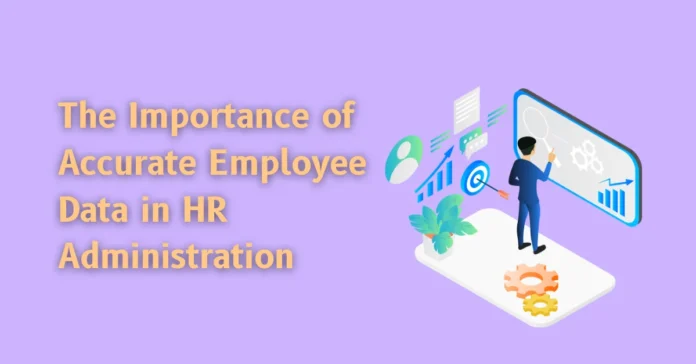In HR administration, the accuracy of employee data plays a pivotal role in ensuring smooth and efficient operations. From compliance to decision-making, accurate data directly impacts an organization’s ability to manage its workforce effectively. Below are several reasons why accurate employee data is crucial:
1. Compliance and Legal Requirements
Accurate employee data is essential for meeting legal and regulatory requirements. HR departments must ensure that personal details, employment history, compensation, benefits, and tax information are precise and up-to-date. Incorrect data can lead to compliance issues, penalties, or legal challenges, especially in areas like payroll, tax reporting, and equal employment laws.
2. Efficient Payroll Processing
Payroll accuracy relies heavily on correct employee data, such as salary, tax withholding preferences, and benefits elections. Even a small error in an employee’s hours worked or compensation package can result in overpayments, underpayments, or compliance violations. By maintaining accurate records, HR admins can prevent costly payroll mistakes and ensure timely, accurate payments to employees.
3. Improved Decision-Making
HR professionals use employee data to make informed decisions about staffing, training, promotions, and performance management. Accurate data on skills, qualifications, performance reviews, and work history helps leaders identify top talent, promote internal mobility, and plan for future workforce needs. Without reliable data, decisions may be based on assumptions or incomplete information, leading to inefficiencies or missed opportunities.
4. Enhanced Employee Experience
Accurate employee data is key to delivering a positive experience throughout the employee lifecycle—from recruitment to retirement. When HR admins can quickly and accurately update personal information, process requests for time off, and manage benefits, it improves communication and trust. Employees are more likely to feel valued when their HR records are correctly handled and when they receive accurate information about their pay, benefits, and career growth.
5. Data-Driven HR Strategies
HR departments are increasingly relying on data analytics to drive strategy. Accurate employee data allows HR teams to generate insights that can improve workforce planning, diversity and inclusion initiatives, employee engagement, retention, and training programs. Analyzing trends in employee data helps businesses develop targeted strategies for organizational growth.
6. Cost Savings
Maintaining correct employee records helps avoid financial mistakes and reduces administrative burdens. For example, inaccurate benefit selections can lead to additional costs, such as excess insurance premiums. Additionally, HR admins spend less time correcting errors when data is accurate from the start, freeing up resources for strategic initiatives rather than administrative tasks.
7. Security and Data Protection
Ensuring accurate data also means implementing strong data security measures. Sensitive employee information—such as social security numbers, bank details, and health records—must be protected from breaches. By maintaining accurate and organized records, HR can ensure that only authorized personnel have access to confidential data and that it is stored securely.
8. Streamlined HR Processes
HR core functions, such as recruitment, performance reviews, benefits administration, and employee development, all rely on up-to-date and accurate data. When records are accurate and organized, HR processes can be streamlined, reducing the risk of errors, delays, and inefficiencies.
Conclusion:
Accurate employee data is the foundation of effective HR administration. It ensures compliance, enables data-driven decision-making, supports efficient payroll and benefits management, and enhances both organizational performance and employee satisfaction. As HR technology continues to evolve, the importance of maintaining high-quality, accurate data will only grow. By investing in proper data management and regular audits, organizations can foster a culture of trust, reduce risks, and improve overall efficiency.
If you are an HR professional or part of a leadership team, it’s crucial to prioritize data accuracy to ensure your organization’s HR operations remain smooth and compliant.
#HRManagement #EmployeeData #HRCompliance #DataAccuracy #PayrollManagement #HRBestPractices #EmployeeExperience #HRTechnology

